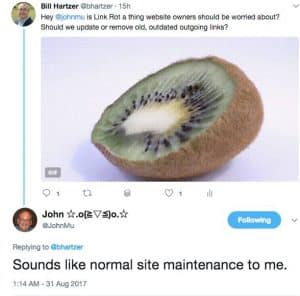Google’s John Mueller has confirmed that link rot is normal website maintenance. I will go one step further and say that you should be dealing with it on a regular basis. There is no confirmation or indication that dealing with link rot will improve search engine rankings. However, I personally believe that dealing with link rot on a regular basis will improve the overall quality of your website. And, quality websites generally get more traffic from Google.
What is Link Rot?
Well, what exactly is link rot? Link rot is phrase that’s used to describe dead links… or links that are no longer valid. Wikipedia’s definition of “link rot” is “Link rot (or linkrot) is the process by which hyperlinks on individual websites or the Internet in general point to web pages, servers or other resources that have become permanently unavailable.”
So basically, on your website (especially if you have a blog), you link out to other web pages. That’s natural. If you mention another website, there’s a good chance that you linked out to that other website. But, over time, those web pages that you linked to a year or two or three years ago could go away. People shut down their websites, remove articles, and even don’t renew their domain names. Others may actually buy expired domain names and take advantage of the links. So, that great article or page that you linked to three years ago on your blog might now point to (gasp!) an adult website or even a site that’s got malware on it.
Link rot is a part of maintaining a website. And, for search engine optimization purposes, you should be concerned about having a quality website: at least in Google’s eyes. Link rot, and dealing with old outgoing links, is something that you need to deal with. I have my suspicions that dealing with link rot on your website is a quality issue. And, as such, Google only wants to link to quality websites. If you have a lot of outdated links on your website, then those links could be rotting or have rotted (whatever you want to call it or however you want to refer to it).
It’s my opinion that if you deal with link rot or you’re linking out to websites that have broken links and you fix those links, you’ll get better search engine rankings.
I just deal with a few websites (client websites) that have had a tremendous amount of outgoing links. One website, who has a blog, has over 1200 blog posts. They typically linked out to about 3-5 websites on each post. That’s literally about 6500 outgoing links! I cleaned up that website’s links, and got it down to about 250 outgoing links that I know are good–websites who are good about maintaining their pages and links. I am confident that removing the link rot and dealing with it will get this website better rankings in Google.
Google Confirms: Link Rot is a Thing
I confirmed today, with John Mueller of Google, that link rot is something that you need to deal with. It’s regular website maintenance.
So, you can read John Mueller’s response to my question however you want. But if you’re a webmaster or website owner (or SEO), I would be maintaining your websites. And, that includes dealing with link rot.
When you’re updating your website or doing a website migration, consider reviewing all of the links that are outgoing on your website. Make sure that the websites you’re linking to are still up and running, and you’re linking to where you should be linking. You should also be doing this if you are combining websites into one website. Check all of the outgoing links on your site during that process.

